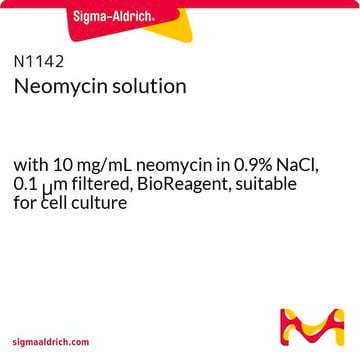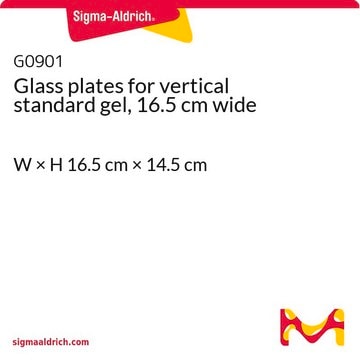G8168
G418 disulfate salt
solution, non-animal origin, suitable for cell culture, BioReagent
Synonym(s):
Antibiotic G418
About This Item
Recommended Products
product name
G 418 disulfate salt solution, 50 mg/mL in H2O, 0.1 μm filtered, BioReagent, suitable for cell culture
biological source
Micromonospora echinospora
Quality Level
sterility
0.1 μm filtered
product line
BioReagent
form
solution
potency
50-60 mg per mL
mol wt
692.7
packaging
pkg of 10 and 100 mL
concentration
50 mg/mL in H2O
technique(s)
cell culture | mammalian: suitable
impurities
endotoxin, tested
color
colorless
solubility
H2O: 50 mg/mL, clear
antibiotic activity spectrum
parasites
Mode of action
protein synthesis | interferes
storage temp.
2-8°C
SMILES string
OS(O)(=O)=O.OS(O)(=O)=O.CN[C@H]1[C@H](O)[C@@H](OC[C@@]1(C)O)O[C@H]2[C@H](N)C[C@H](N)[C@@H](O[C@H]3O[C@H]([C@H](C)O)[C@@H](O)[C@H](O)[C@H]3N)[C@@H]2O
InChI
1S/C20H40N4O10.2H2O4S/c1-6(25)14-11(27)10(26)9(23)18(32-14)33-15-7(21)4-8(22)16(12(15)28)34-19-13(29)17(24-3)20(2,30)5-31-19;2*1-5(2,3)4/h6-19,24-30H,4-5,21-23H2,1-3H3;2*(H2,1,2,3,4)/t6?,7-,8+,9+,10+,11-,12-,13-,14+,15+,16-,17-,18+,19-,20+;;/m0../s1
InChI key
UHEPSJJJMTWUCP-NKCAIAFTSA-N
Looking for similar products? Visit Product Comparison Guide
General description
Application
Biochem/physiol Actions
Antimicrobial Spectrum: G418 selects for cells stably transfected with an iNOS promoter construct and neomycin resistance gene and shows activity against protozoa and helminthes.
Caution
Signal Word
Danger
Hazard Statements
Precautionary Statements
Hazard Classifications
Resp. Sens. 1 - Skin Sens. 1
Storage Class Code
12 - Non Combustible Liquids
WGK
WGK 3
Flash Point(F)
Not applicable
Flash Point(C)
Not applicable
Certificates of Analysis (COA)
Search for Certificates of Analysis (COA) by entering the products Lot/Batch Number. Lot and Batch Numbers can be found on a product’s label following the words ‘Lot’ or ‘Batch’.
Already Own This Product?
Find documentation for the products that you have recently purchased in the Document Library.
Customers Also Viewed
Articles
Lentiviral vector systems prioritize safety features, with design precautions preventing replication. Good handling practices are essential for use.
Lentiviral vector systems prioritize safety features, with design precautions preventing replication. Good handling practices are essential for use.
Lentiviral vector systems prioritize safety features, with design precautions preventing replication. Good handling practices are essential for use.
Lentiviral vector systems prioritize safety features, with design precautions preventing replication. Good handling practices are essential for use.
Protocols
Lentivirus versions of genome modification technologies support successful CRISPR, RNAi, and ORF experiments.
Lentivirus versions of genome modification technologies support successful CRISPR, RNAi, and ORF experiments.
Lentivirus versions of genome modification technologies support successful CRISPR, RNAi, and ORF experiments.
Lentivirus versions of genome modification technologies support successful CRISPR, RNAi, and ORF experiments.
Our team of scientists has experience in all areas of research including Life Science, Material Science, Chemical Synthesis, Chromatography, Analytical and many others.
Contact Technical Service





